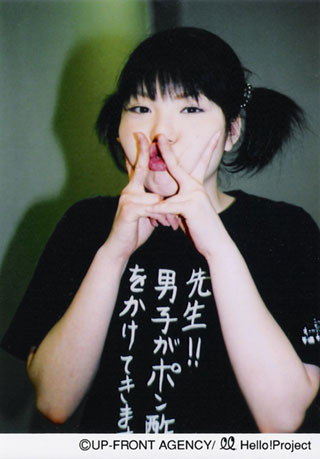Japan
"Help Wanted"
“Long hours, unsafe working conditions, no benefits. Must supply own uniform.”
“Batteries not included. Not a union job.”
Not dodging the issues...
Ai Kago was suspended from Hello!Project for underage smoking, then kicked out completely for getting caught at a hot-springs resort with a notorious womanizer. She’s been slowly coming back into the business with a new agency, with small acting roles, an essay book, and a blog, but her first high-visibility product is a DVD: Kago Chan-neru.
Unlike modern politicians, she’s not afraid to confront her past…
I'm tired of election "news", so here's Tokyo
For quite a while now, I’ve been meaning to go back and do some cleanup work on the small number of photos I shot out of our hotel room window. The one I originally posted just never looked right to me. This one is the result of some careful Levels work, combined with the updated version of Noise Ninja that works as an Aperture plug-in.
Ponzu?
Makoto‘s t-shirt says 「先生‼男子がポン酢をかけてきます」. All I can tell you is that the design came from Mari Yaguchi’s old radio show, and a bunch of H!P girls have been spotted in it. Apparently they get a bit goofy sometimes, if that wasn’t obvious from her expression.

Wishful thinking...
The only email spam I read is the stuff that arrives in Japanese. Every once in a while I’m tempted to print one out and take it into my reading class, but so far I’ve resisted. I’m trying to avoid the “creepy older guy on campus” image.
My English spam seems to focus around filter-evading euphemisms for chemically-induced potency and larger body parts, but the stuff I get in Japanese is about 90% “come to our site if you want to meet women”. The pitch varies from week to week, and the current one is hilarious: 逆援助.
Literally, gyaku-enjo would be “reverse support”, but enjo means something special in the minds of Japanese men: enjo-kousai, which can be translated as either “subsidized dating” or “schoolgirl prostitution”, depending on your mood.
Reverse enjo, then, is every struggling salaryman’s dream: beautiful younger women who’ll pay you for sex. Keep the dream alive, guys.
〜だらけ
All the J-E dictionaries I’ve checked either insist or at least imply that the suffix -darake (“full of ~; covered with ~”) always has a negative meaning. Certainly the vast majority of uses are negative, but the reason I looked it up in the first place was a clearly positive example, an illustrated guide to the Imperial Japanese Army called ドキッ乙女だらけの帝國陸軍入門 (literally, “exciting filled-with-maidens imperial army introduction”).
It came up in class this week in one of the standard examples, 血だらけ, “covered in blood”. Mud, idiots, lies, mistakes, demons, and holes are also very commonly used with this suffix, but a quick search of Amazon Japan turns up book titles featuring cats, dreams, cat stickers, angels, women, haiku, mysteries, riddles, and, in the adult DVD section, a variety of special-interest items.
So, usually negative, but can be positive in anything from children’s books to fetish porn.
Free kittens to good home!
The hot news in the idol world is that Hello!Project has announced the “graduation” of every member over the age of 22. Some of them have outside careers that have been providing most of their work for a while (Yuuko Nakazawa, Mari Yaguchi, Mai Satoda, Miki Fujimoto), two of them were semi-retired into motherhood (Kaori Iida, Nozomi Tsuji), two of them were just spun off into their own, hideously-dressed (even by H!P standards) group that will be part of H!P’s parent agency (Rika Ishikawa, Hitomi Yoshizawa), and as I mentioned yesterday, the only one of the grown-ups they were actively promoting just turned up in Hollywood (Natsumi Abe).
The other fifteen or so? Pretty much doomed. Not only are most of them poorly-equipped for solo careers, but the agency owns their music, image, band names, and every picture taken of them since about age 14. No more fan club, no more merchandise, no more occasional appearances to remind fans that they exist, etc.
The oldest remaining member is just-turned-22 Ai Takahashi, who by a strange coincidence just got a lead role in a tv drama series. Good call, Ai-chan; this is not a good time to rest on your laurelsgiant pile of photobooks.



